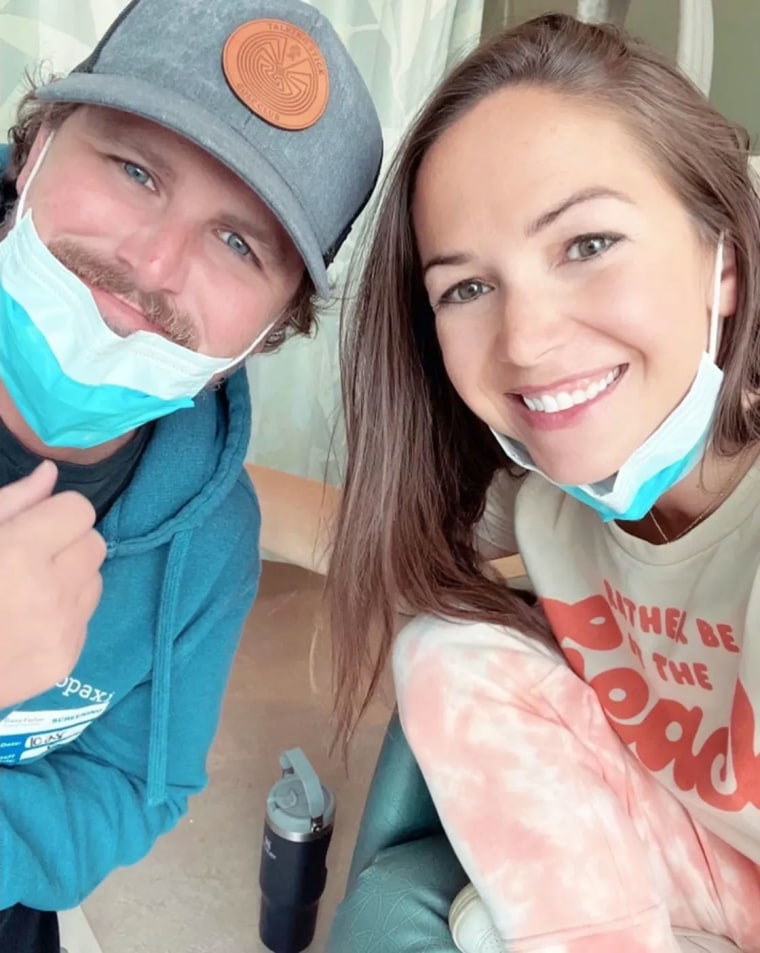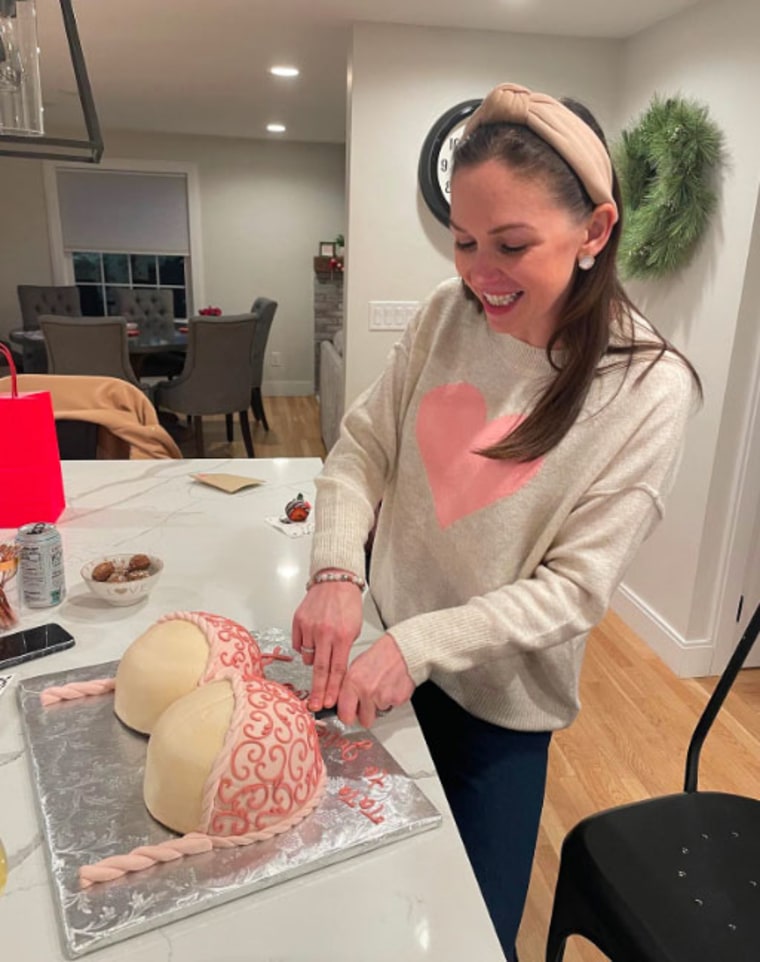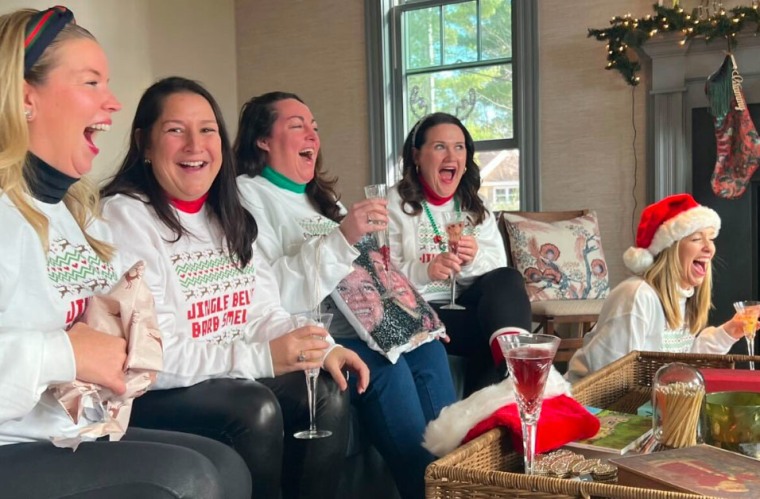Cancer is undeniably a serious, terrifying thing — so much so that it’s become part of a common expression to describe anything extremely serious, not funny or joking. (Jill: “Are you serious?” Julie: “As serious as cancer!”)
As such, the responses I got when telling people I had cancer were, of course … extremely serious, not funny or joking.
Calling people with “the news” became a hellish crash course in crisis communications. Who to tell? When? What’s the message? I’ve never dreaded anything more in my entire life than the phone call I made to my parents to ask them if they could pick up our three young kids from school so that my husband and I could go to an urgent doctor’s appointment.
Before I picked up the phone, I took a deep breath and looked at the new coffee pot my husband and I had just opened but didn’t have the time to use in the flurry of getting the kids off to school that morning. It sat in the corner of the kitchen, in a pile of cardboard. Instead, I was now brewing what I can only describe as a blood-boiling fear that made me feel both numb and on fire at the same time.
“Bet you didn’t expect to have such a fun time in this house, did you, coffee pot?!” I said to it, sarcastically.
And I laughed.

I did not want this phone call, or the ones that would follow with other people in my life, to have a distinct before and after. (Before I told you, we laughed and life was light. After I told you, everything became so serious.) In this terrifying moment, bracing for what would arguably be one of the worst phone calls of my life, I didn’t want to lose the lightness of life, along with all of the other things the breast surgeon had warned I would lose with this diagnosis.
I told my parents matter-of-factly what was happening. I ended dryly — channeling my best Alexis Rose from “Schitt’s Creek” voice (which I do pretty well) — with, “So with that, can you also pick up the kids from school? I wasn’t really planning on getting diagnosed with cancer today!” I tried to signal with my tone that all laughter mustn’t be lost.
Fast forward, and there are lots of serious conversations. I didn’t realize that beyond the “I have some news” announcement, there would also be the “how are you doing?” question (usually always asked with a super serious face) and then, “But how are you reallllllly doing?” (this asked with an even more serious face).
Of course, I know all my friends and family had the best intentions. Prior to my diagnosis, I too leaned hard into the empathy pamphlet pivot, searching for the right words to say when things no longer felt appropriate for laughter. I embarrassingly remember Googling what to say when someone has a heart attack, because, well, I didn’t know what the hell to say to a close friend. I landed on “I can’t imagine how hard this is. I’m here for you,” and this became my go-to response for all things serious.
I was now on the other side of the invisible wall that separates those of us living from those of us fighting for life. A land where I had previously believed laughter wasn't welcome. Now that I lived here, I had a new perspective.
But I was now on the other side of the invisible wall that separates those of us living life from those of us fighting for life. It’s a wall I never thought about, because at 37, why would I? But once your mortality is showing — as expressed through illness, injury or decline — you’re over the wall, and you enter perpetual serious-conversation territory. A land where I had previously believed laughter wasn’t welcomed, because I’d never explored it here. Now that I lived here, and my potential mortality was an everyday reality, I had a new perspective. This strange new world was serious, all right. And don’t get me wrong — laughter doesn’t always have a place over here. My diagnosis, while serious, was ultimately deemed aggressive, with a high likelihood of curability. Not all cancer diagnoses have such positive language associated with them. While my journey would have very dark days, there would be light at the end of my long journey.
If I wanted laughter along for the ride, I had to let people know it was welcome. I had to let people know they had permission to laugh and be light, and to continue being themselves around me. Before visitors came to our house, I would text them the same sentence: “Our home is still light. We laugh, we have music on, we’re living!” I distinctly remember telling a friend who wasn’t sure what to expect when she came by, “My kids are still asking me for 100 snacks, and yell at me for how I cut their apple wrong — life doesn’t stop!”
If I wanted laughter along for the ride, I had to let people know it was welcome. I had to let people know they had permission to laugh and be light, and to continue being themselves around me.
This approach unlocked so many unexpected moments of joy, which helped make the journey feel a little lighter. For example, we gave my cancer a silly name: Barb. My brother even made a logo for her, and a theme song. Before my double mastectomy, my friends threw a going-away party for my breasts, which we called my “Boob Voyage.”

While these moments may seem silly, they were vital in giving permission to everyone in my life for the light and laughter I needed. And they continued, even when things got hard.
Three days after my double mastectomy and lymphadenectomy, my eyelashes and eyebrows, which I’d fought to keep throughout chemo, fell out. The text conversation among my closest friends went as follows:
“Listen. Your eyelashes grow back. Your nipples won’t — so you got that going for you!”
“I mean, unless there’s a serum for that too we don’t know about …”
I fell on the floor laughing. Crying-laughing. Belly-hurt laughing, wheezing, screaming, tears-rolling-down-your-face laughing.
In that moment, wow, did I need a laugh like that.

When my husband and I got home from the surgeon the night of my initial diagnosis, the blood-boiling terror was now pumping full throttle through both of us. I had HER2+ invasive breast cancer, which was eventually diagnosed as stage 3, as it had spread to my lymph nodes. I’d need chemo, a double mastectomy, lymph node removal, radiation, reconstruction — a brutal year or more of treatment ahead of us. Yet, we still had to come home and be parents to our kids.
And my parents still had to be parents to me when I got home.
My mom and dad greeted us not with the millions of serious questions they undoubtedly had, but with the hilarious story about my dad completely missing the memo on how to do school pickup. Instead of pulling into the pickup line, he parked the car and held up a handmade sign with my kids’ names (only one knows how to read, by the way) like a cab driver at Logan Airport.
We all fell on the floor, laughing — crying-laughing — for many reasons.
At that moment, on that day, wow, did we all need a laugh like that.